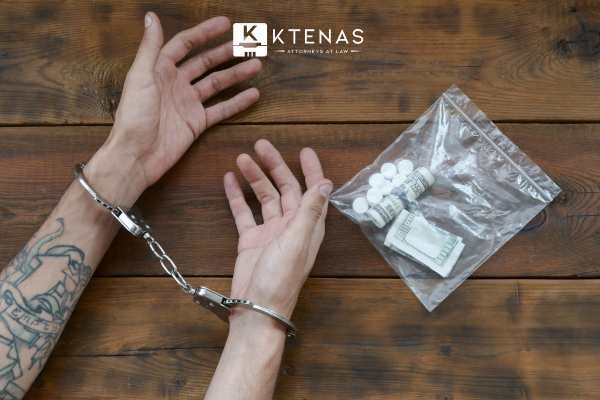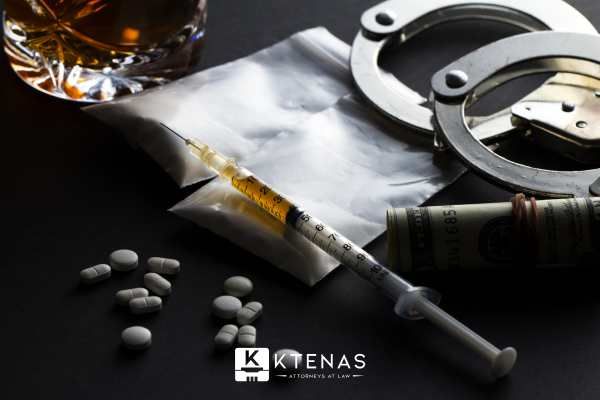Can You Legally Record Police Officers?
11/09/2025
Facing a first-time drug charge in Illinois can be an overwhelming experience, especially if you’re unfamiliar with the legal system. The penalties for even minor drug offenses can include fines, probation, and a criminal record that may impact your future. Understanding what lies ahead can help you make informed decisions and better prepare for the challenges you might face.
If you or a loved one are dealing with a first offense drug charge, securing experienced legal representation is crucial. A knowledgeable drug defense lawyer in Chicago can guide you through your options, advocate for your rights, and work to minimize the impact of the charges on your life. Don’t navigate this alone—call us at (312) 756-8652 to get legal advice and protect your future.
In Illinois, the penalties for drug crimes on a first offense can vary based on several factors, including the type and amount of the substance involved, the location of the offense, and any aggravating circumstances. Below is an overview of the potential consequences for various drug possession charges and related offenses.
Possession of a controlled substance, such as illegal drugs like heroin, cocaine, methamphetamine, or even anabolic steroids, can lead to different consequences depending on the substance and quantity:

Defendants charged with drug possession charges for minor quantities may be eligible for probation instead of criminal penalties like prison sentences, especially if it’s their first offense. The court may impose a specific type of probation, such as supervised probation, that requires regular drug testing or counseling. A skilled attorney can also assess whether the evidence against the defendant resulted from an unlawful search by a police officer, which could lead to reduced charges or dismissal.
The court will assess the circumstances, such as whether the drugs were intended for personal use or distribution. Drug convictions for larger quantities may carry harsher penalties due to their greater potential for abuse and harm to the community.
While marijuana is legal in Illinois for medicinal use and limited recreational use, possession over the legal limit can result in criminal penalties and significant fines:
Illinois law is distinct from Federal drug laws, which still classify marijuana as an illegal substance, creating additional complexities for defendants facing drug crime convictions.
If evidence suggests that the defendant intended to distribute drugs, such as large quantities or possession of packaging materials, the charges escalate significantly. PWID can result in a class 1 or class X felony and comes with the following penalties:
These charges are particularly serious and often result in lengthy prison sentences and substantial fines. Legal representation is crucial in such cases, as experienced criminal defense attorneys can examine the evidence for issues such as unlawful search or violations of due process. Defendants facing these charges may also encounter complications under Federal drug laws, particularly for controlled substances like methamphetamine and heroin.
Possession of drug paraphernalia, such as needles or pipes, is a common misdemeanor charge for first offenders.
While the penalties may seem minor compared to felony offenses, any drug crime conviction can have lasting effects on employment, housing opportunities, and personal reputation.
For certain first-time drug possession charges, courts may explore alternatives to incarceration, particularly for minor offenses:

The penalties for a first offense in Illinois can range from probation and hours of community service to significant prison sentences, depending on the case specifics. Hiring a defense lawyer for drug charges can help reduce penalties or negotiate a plea deal.
In Illinois, the outcome of a first offense drug case depends on several factors, such as the type and amount of drugs involved, the circumstances of the arrest, and the defendant’s history. Here’s an overview of the key elements that can affect the case:
The specific substance and its quantity significantly impact the charges. Possessing illegal drugs like heroin, cocaine, anabolic steroids, or methamphetamine carries harsher penalties than possessing marijuana over the legal limit. Additionally, larger quantities may indicate intent to distribute, leading to more severe drug crimes and higher fines.
Although the charge may be for a first offense, a defendant’s prior criminal history can influence the outcome. If there are previous convictions, even unrelated to drug possession charges, penalties may be harsher. A history of minor offenses or other infractions can negatively affect how the court views the case.
A skilled attorney will also evaluate the actions of the police officer during the arrest. If there is evidence of an unlawful search, this could lead to reduced penalties or even dismissal of the criminal charge.
Certain factors can elevate the severity of the charges and increase the penalties for drug possession. For instance, possessing drugs near schools or parks could lead to harsher consequences due to the added risk to public safety. Illinois enforces tough drug laws to discourage drug activity in sensitive areas. Additionally, if a weapon is found alongside the drugs or during the arrest, it can result in more serious charges, longer prison sentences, and harsh consequences.
An illegal search by law enforcement during the arrest could, however, provide grounds to challenge the evidence. An experienced attorney can evaluate the search and seizure process and incorporate these findings into your defense strategy.
A defendant’s behavior during the criminal justice process can influence the case’s outcome. Cooperation with law enforcement or the court may lead to a plea bargain that reduces the charges or penalties. Taking proactive steps, such as attending counseling or enrolling in drug treatment programs, demonstrates remorse and responsibility, which can sway the court to impose less severe sentences.
Furthermore, showing genuine remorse and a willingness to rehabilitate may protect defendants who hold professional licenses from losing their credentials due to the conviction. Actions such as complying with treatment programs or community service requirements can help mitigate long-term impacts.
Illinois offers diversion programs and alternative sentencing options to first-time offenders, allowing them to address underlying substance abuse issues without facing jail time. Programs like Drug Court require participants to complete therapy, drug counseling, and regular court monitoring. Successful completion may lead to the dismissal of drug charges and prevent a conviction from appearing on the defendant’s public record.
For those charged with the misuse of prescription medication, participating in a diversion program may provide an opportunity to address the issue while avoiding harsh consequences like incarceration. These programs focus on rehabilitation and preventing repeat offenses.
Judges in Illinois have discretion when sentencing, particularly for first-time offenders. While they follow state guidelines, they also consider mitigating factors such as the defendant’s cooperation, potential for rehabilitation, and the nature of the offense. This flexibility allows judges to impose sentences that focus on treatment rather than punishment.

For example, defendants charged with possessing small amounts of prescription medication without proper authorization may receive probation or treatment instead of jail time. A strong defense strategy developed by an experienced attorney can help highlight mitigating circumstances, improving the likelihood of a more favorable sentence.
First-time offenders in Illinois may be eligible for probation or other alternatives to incarceration, providing a chance for rehabilitation while avoiding the harsh consequences of a conviction. Probation often requires compliance with strict conditions, including regular meetings with a probation officer, drug testing, and participation in treatment programs. Noncompliance with these conditions can lead to revocation and imprisonment.
Diversion programs, such as Drug Court, address the root causes of addiction through therapy, job training, and regular court monitoring. Successful completion of these programs may prevent the offense from appearing on a public record and help protect professional licenses that might otherwise be at risk.
Additionally, first-time offenders charged with the misuse of prescription medication or other drug possession charges may qualify for Second Chance programs that focus on rehabilitation and education. These programs offer a fresh start and reduce the likelihood of reoffending.
Facing penalties for drug possession in Illinois can lead to harsh consequences, including incarceration, hefty fines, and long-term effects on your career and personal life. However, with the right legal guidance, you can explore options like diversion programs or probation to mitigate these outcomes and work toward a second chance. Whether you’re dealing with charges related to prescription medication, illegal drugs, or other offenses, securing experienced legal representation is critical.
At Ktenas Law, our dedicated legal team in the Chicago area, Illinois, is here to provide the skilled advocacy you need. We understand the complexities of Illinois drug laws and will work tirelessly to protect your rights, challenge any illegal searches, and develop a personalized defense strategy tailored to your case.
Contact Ktenas Law today to schedule a free consultation to discuss your case and start building a path toward the best possible outcome. Don’t face these challenges alone—let us help you protect your future and move forward with confidence.

